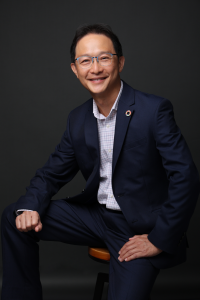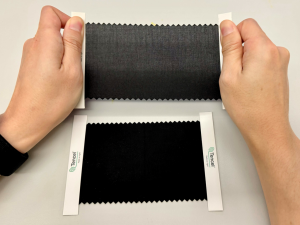LENZING, Austria — January 17, 2024 — Lenzing Group, a global producer of wood-based specialty fibers, announces a new processing technique of TENCEL™ branded lyocell fibers tailored to create stretch fabrics that enhances comfort of the wearer. This solution offers a fossil-free alternative that delivers exceptional stretch and recovery properties while adhering to responsible production methods.

Fabric innovation features enhanced stretch, comfort and easy-to-care properties
Lenzing’s new processing technique involves re-engineering woven fabric composed of TENCEL Lyocell fibers coupled with a fabric pre-treatment. During the wet process, TENCEL Lyocell fibers undergo significant swelling in diameter, leading to increased yarn crimps in the widthwise direction. This translates into a fabric that can stretch with enhanced recovery1 and does not shrink or wrinkle easily, maintaining a smooth appearance even after home laundering2.
“Our technical innovation unlocks the inherent potential of TENCEL Lyocell fibers for producing stretch fabrics that move in harmony with the body. This enhances comfort with easy-to-care properties, making it ideal for lightweight apparel,” said Rex Mok, vice president of Fiber Technical Marketing and Development at Lenzing. “We are committed to fostering responsible production practices3 through innovations in the textile sector and are delighted to share this latest innovative development with our fabric mill partners. Together, we are taking a significant stride towards reduced usage of fossil-based materials within the textile value chain while ensuring comfort and material performance.”

Empowering partners in their journey towards a more sustainable future
To take a step further, Lenzing extends its comprehensive support at the fabric development level to mill partners. The stretch fabrics made using TENCEL™ Lyocell fibers meet the international standard for fabric stretch and recovery properties4. The collaboration with Lenzing will enable mills and brands to unleash unlimited design possibilities while addressing the growing consumer demand for comfortable apparel produced responsibly, particularly in sectors such as sportswear, athleisure garments, loungewear, and home textiles.
 A fossil-free alternative to conventional synthetic materials, TENCEL™ Lyocell fibers used in the stretch fabrics are derived from controlled or certified wood sources and made from a resource-saving closed-loop production process5. Additionally, the fibers are identifiable in end products and traceable back to their sources, ensuring greater accountability and transparency in the supply chain.
A fossil-free alternative to conventional synthetic materials, TENCEL™ Lyocell fibers used in the stretch fabrics are derived from controlled or certified wood sources and made from a resource-saving closed-loop production process5. Additionally, the fibers are identifiable in end products and traceable back to their sources, ensuring greater accountability and transparency in the supply chain.
1 Data from SGS Report No SL12100263549701TX. Material: fabrics made of 100% TENCEL™ Lyocell Ne30 x Ne30 / 98*74.
2 Data from SGS Report No SL12200348946801TX: Material: fabrics made of 100% LENZING™ Lyocell Ne50 x Ne50 / 116×75.
3 TENCEL™ Lyocell and Modal fibers are made with at least 50% less carbon emissions and water consumption, compared to generic (unbranded) lyocell and modal. The results were calculated according to LCA standards (ISO 14040/44) and are made available via the Higg MSI by Sustainable Apparel Coalition (Version 3.7).
4 The “BS EN 14704-1” standard published by the British Standards Institution determines the elasticity of fabrics.
5 Savings consider solvent recovery.
Posted: January 18, 2024
Source: Lenzing Group




